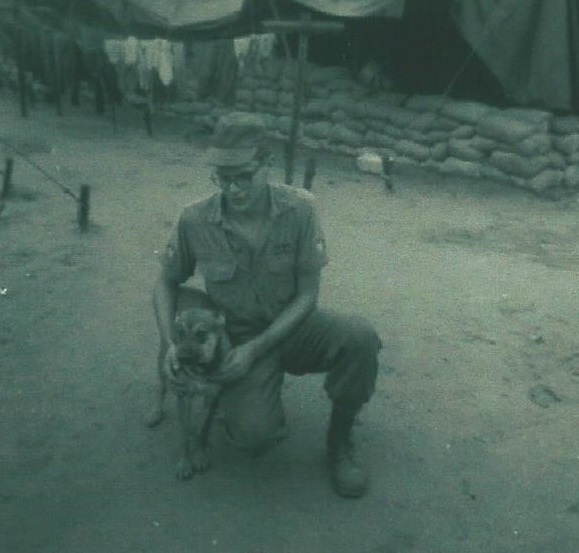Vietnam Speech to Cheyenne Myers’ World Cultures Class– May 30, 2012
Good Morning Students and Teachers!
I was asked to give about a 20 minute talk to your class about my thoughts and experiences in Vietnam. I did this once before for a different occasion and after I accepted this invitation, I kept asking myself, “What was I thinking?” I need to make it clear that this is what I went through and what I saw and felt – not what anyone else experienced. Each person over there had their own experiences and has their own memories. You also have to remember this happened 47 years ago – my memory isn’t as sharp as it once was!
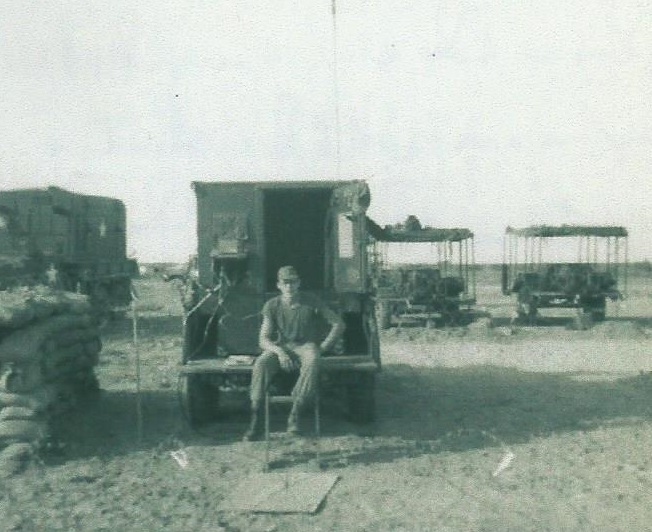
Tom sitting outside his communications box/truck in Dong Tam.
Cheyenne said it would be nice if I would wear my uniform – and I said “Yes it would be nice!” But when I retrieved it from the attic, it seems as if the heat up there shrank it! At least that is the only reason I can think of that it doesn’t fit! So Cheyenne will have to do her best to model it – although it doesn’t fit her for the opposite reason!
How many of you were ever drafted for something? I ask this because usually when you are drafted, it isn’t really something you wanted to do in the first place. It wasn’t my first choice of occupations to join the military. I already had a job and a financée, but in 1965 I received a letter saying Uncle Sam needed me – NOW! So off I went – 19 years old and I knew everything! I soon found out that I didn’t know anything – or at least that is how I was made to feel! Once I entered the induction station, which for me was Fort Jackson, South Carolina, I was in the Army now! I got yelled at, given a buzz-cut hair style, fatigues (daily uniform), and then other non-civilian clothes – and yelled at a whole lot more! This continued until I was sent to basic training camp – and then I was yelled at a whole lot more there! That was where I received my basic combat training. I was taught how to obey orders, shoot weapons, and fight in hand-to-hand combat. I did my basic training at Fort Hood, Texas – which you may have heard of in more recent history for the terroristic attack there.
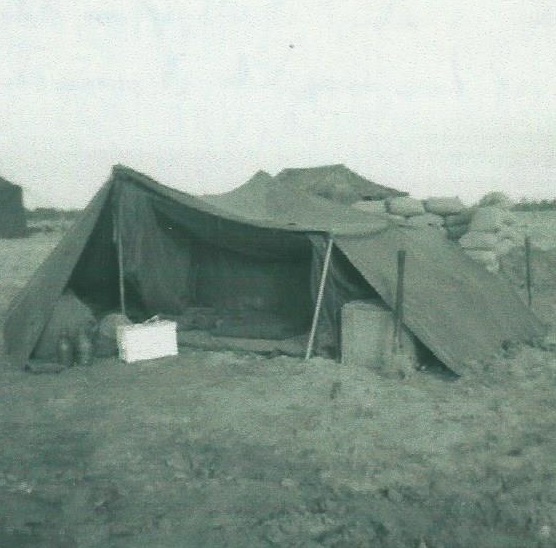
2-man tent
After Basic Training, I was sent to Fort Gordon, Georgia, for Signal/Communication School. Now, the worst subject that I had had in High School was typing, and I really think the teacher passed me because she did not want to see me again the next year! It was bad!!!! So guess what I became in the Army? A teletype operator! Now what did I do as a teletype operator? Type! The Army had its own way of teaching and besides, I wasn’t really given a choice! I ended up being able to type 60 words a minute without any mistakes! I also got a secret security clearance so that I was able to handle cryptographic machines that the Army used to send secret messages. While at signal school, we were shown this real nice communication building that we would probably be working in. Then they took us outside and back behind the building and showed us this box that fit on the back of a 2 ½ ton truck and told us to take a good look because we probably would never see one again. Guess what? That is what I worked in for one whole year in Vietnam!
we were not allowed to walk through the airport building because of protesters
Next I was sent to Fort Riley, Kansas, for assignment to the 9th Signal Battalion of the 9th Infantry Division. Here I got more training. In November of 1966, about one year after I received my “Uncle Sam needs you” letter, I received orders to go to Vietnam. When our troop got to the airport in Kansas, we were not allowed to walk through the airport building because of protesters and were told that our presence might cause a problem! So we all had to march the whole way around the building to get to our air plane. We flew to California and then went to Vietnam by boat. This was not a real good experience – didn’t want to go; too many people, and not enough space on that ship! On this “luxury liner” my “personal space” was my bunk (bed). To get into it, I had to get hold of the bunk above me and swing myself in because there was only about 2 feet between my bunk and the bunk above me. And then there were 3 or 4 bunks stacked above – so the bottom soldier always really hoped the upper soldiers didn’t get sea sick! The tables in the mess hall (cafeteria) had a lip around the sides so when the ship hit a storm and it rolled, the food trays didn’t slide off. I really don’t remember how many guys there were, but it was a way too many! I spent a lot of time out on top deck!!! 21 days later we stepped off the ship and onto the shores of Vietnam.
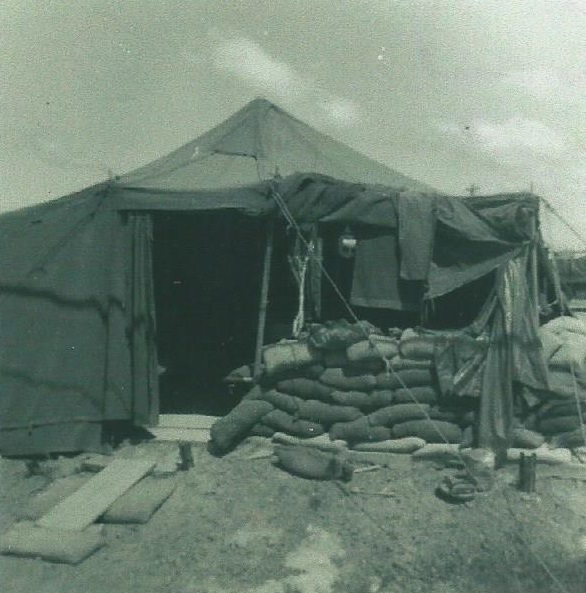
16-man tent
We definitely had culture shock! Small kids met us and would sell their sister or mom for a pack of cigarettes or ration cards. Here we were, a bunch of young “kids” in a land we never heard of and not knowing why we were really there. And after being there for awhile, we learned to not trust any of the native people because we could not tell the “good guys” from the “bad guys.”
The weather was usually very hot and then the next minute it would be raining! We didn’t worry about getting wet because in a couple of minutes, we were dry from the heat!
I was sent to Dong Tam for part of my tour. We went by helicopter, and when we landed, there was nothing there but sand on top of the rice patties, a ¼ ton trailer, and a couple of tanks guarding the perimeter. This was to be our home for at least six months.
we could not tell the “good guys” from the “bad guys”
Another guy and I lived in a pup tent for 2 weeks. Each soldier was issued ½ a tent and half the stakes and polls to make one tent. So you had to buddy up with someone else to have a complete tent! After the 2 weeks, we put up 16-man tents and that was what I called home for the rest of my time there. Now – think about this – how many of you lock your doors at night in your house? Here we were in a foreign and hostile land, with enemy all around, and didn’t even have doors to lock! With that said, I want you to know that I slept with my rifle, helmet and bullet-proof vest. When the siren that told us we were getting mortared sounded, I did not stop to get dressed! There were many times I was in the bunker with nothing on but my BVD’s, vest, helmet and rifle. One time a guy a couple of tents away stopped to put his boots on and didn’t make it. You never knew . . .
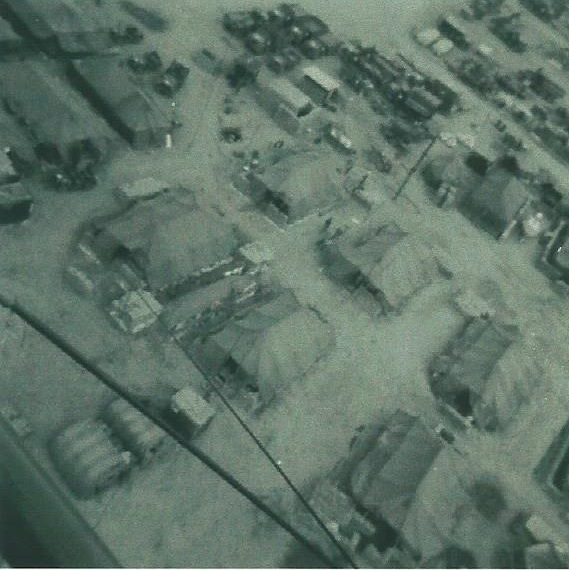
Aerial view of Dong Tam Camp
Helicopters played a very big roll in Vietnam. At night we would sit outside our tents and watch them fly along the Mekong River, shooting 50 caliber machine guns towards the ground. They used tracer bullets so they could see where they were shooting. They also had rockets. When you could see and hear the firing you knew the enemy wasn’t far away. It made life real interesting! We ate a lot of C-rations and once we got a mess hall we got K-rations. C-rations (single servings in a can – some good, some not) were given to each soldier. “Don’t eat the eggs” was advice given and taken! K-rations came in gallon cans for the mess cook to prepare.
While there, most of the time our showers consisted of a 55-gallon drum or two on stilts with a valve on the end. We would stand under the valve, open it, and shower with COLD water and then dried off. No walls! The toilets were 7-hole out houses with no partitions between holes. It was nothing for a Vietnamese woman to sit next to you. It’s just the way the culture was. I don’t think I was prepared for this, but then I don’t know what I expected. Looking back, I think at first I was just a scared kid not knowing if I would ever be going home again and wanting to go home right away!
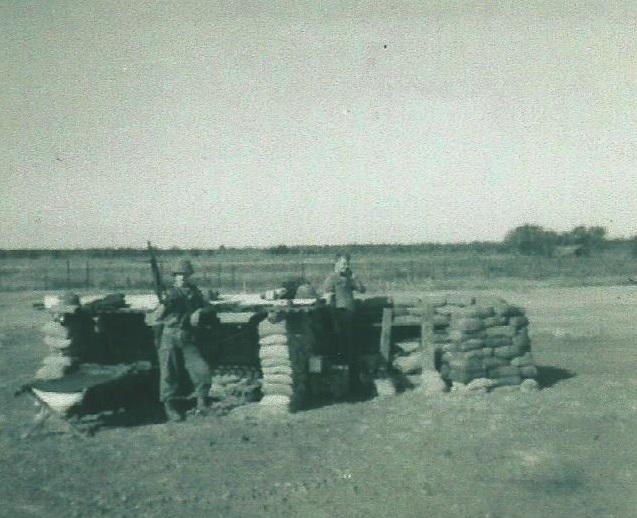
Tom with another soldier on guard duty
We got mortared, shot at, and yelled at! I worked in a small communications center on the back of a ¾ ton truck until the base was built. Then we went to a center on a 2 ½ ton truck and our shifts were usually 12 hours long. I didn’t have it near as bad as a lot of the other men and women. I was very fortunate. I didn’t have to crawl through the jungle – never knowing when I would step on “punji sticks” or land mines – or crawl through tunnels like rats. I didn’t lose any limbs or my life – as many did. I didn’t see my close friends killed. My heart goes out to those people who are still suffering after all these years!
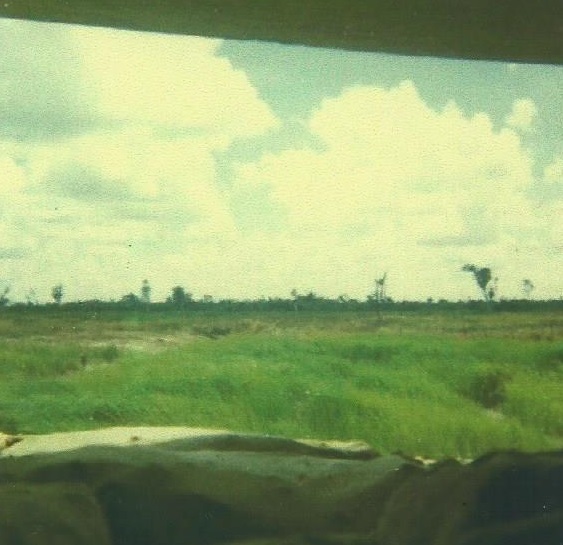
Typical view of the perimeter of the camp when looking out of a bunker
One of our jobs was to type and send the “Captive and Causality Reports” each day. These particular reports were for both sides of the war – enemy and us! We were the outside link for the base. We also got good messages – like births of babies back home, etc. They always got priority! All messages went out and came in using a code – that is what the cryptographic machine did. The machine scrambled the messages on the way out to other locations then unscrambled messages on the way in to us.
Rice patties, jungle, hot weather, rain, and not wanting to be there didn’t help matters at all!
Once there, all we heard on the radio was propaganda from “Hanoi Hannah” (disc jockey for North Vietnam) about how much our own people didn’t support us. (You can Google “Hanoi Hannah” if you want to learn more about this woman and what she did to try to damage our soldiers’ moral.) This didn’t help matters much either. When our tour was up, we just sort of “snuck back into society” because the war had still not been declared a “war” and so many people thought we shouldn’t have been there to start with. No fanfare – no celebration – no parades – not really much of a “thank you.” We were just glad to be home again!
After my tour was up and years later, I can see why all the yelling and following orders was necessary. When in a combat situation, a soldier must respond immediately, with NO questions asked! If one hesitates, lives could be in jeopardy!
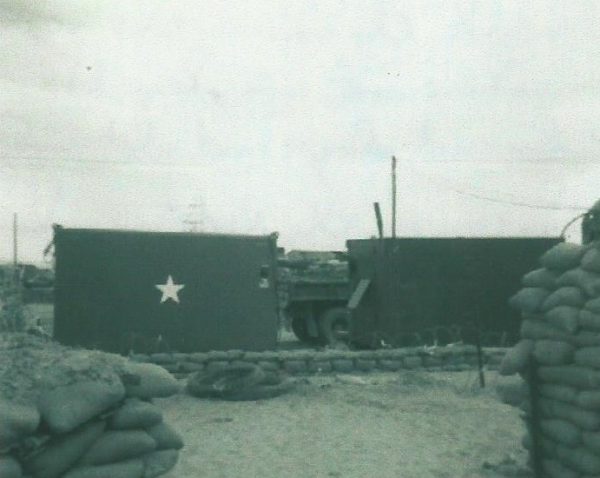
Larger communications boxes replaced the small box/trucks. They would be set on the ground and covered in sandbags.
How many of you have cell phones? In 1966-67, there weren’t such things there! And no email or Facebook either! So the only way to communicate with home was by writing letters. Mail was also censored – both incoming and outgoing mail – so you never knew if or when your letter might get to its intended recipient. Phone service was almost non-existent – so it was not only hard on the soldier, but also his family at home! My family did not hear my voice for a whole year!!! How many of you have boyfriends or girlfriends? How would you like not being able to talk, Tweet, or speak to them for a whole year??? It definitely caused problems. I think as a result of the Vietnam war, the country is more aware of the problems at home. I went away a 19-year old and came back 2 years later and a lot of my friends had moved on with their lives but for me it was like I had lost 2 years of my life.
Now that I am older, I feel it was my duty and privilege to serve my country. One of my family members told me it is nice that I can give an unbiased talk on Vietnam. I am NOT unbiased – I am an AMERICAN. I am not a whatever hyphen American – I am an AMERICAN. And I am proud to be an AMERICAN! It also makes me more aware and appreciative of what military people sacrifice to serve our country and preserve our freedom. If you don’t think we have freedom, you should visit or live in another country like Vietnam or Iraq or Afghanistan, or many other countries in this world.
58,220 American soldiers gave their lives to protect the freedoms that we enjoy. And this was just in Vietnam! Think of all the wars and conflicts we have had and how many people have sacrificed their all for us! Please don’t take this country for granted! We have problems here, but it is still the best country on earth! If you know a soldier or ever meet one on the street, just say “thank you for serving”. You will never know how much it would be appreciated! Without soldiers we could be living under a dictatorship and not have the choice to be educated or work where we want or travel around the country at will.
Again I want to remind you that these are some of MY experiences and thoughts – not necessarily what all soldiers dealt with.
Thank you for this opportunity to share my Vietnam experiences with you!
– Thomas L. Firestone – November 1966 – October 1967
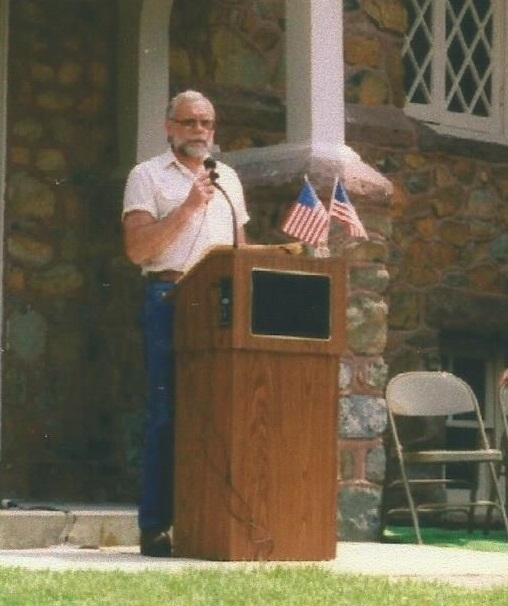
Tom giving a Memorial Day speech in Wellsville, PA at the dedication of a plaque honoring veterans

